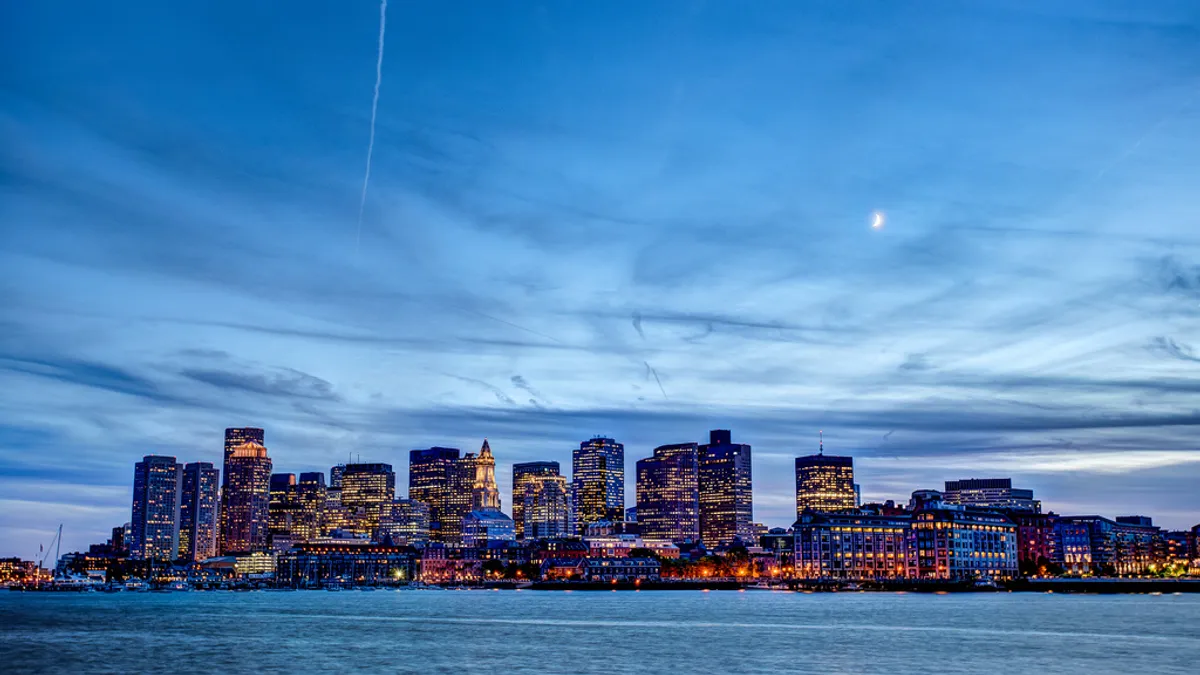As the city-centric trend toward carbon reduction strategies continues to evolve, Boston, Cincinnati, Philadelphia and Phoenix highlighted different strategies for renewable energy progress in a webinar on Wednesday.
Cities consume almost 70% of the world’s energy and are responsible for more than 70% of global carbon emissions, but increasingly they are working together to reduce their footprint and incorporate more renewable energy.
20 cities spanning the U.S. partnered to consider purchasing renewable energy and to incentivize development while West Coast cities issued a joint request for information (RFI) on electric vehicle (EV) charging infrastructure.
"We want to make solar real for our residents."

Michael Forrester
Energy manager, Cincinnati
Cities target renewables growth
Boston Mayor Marty Walsh announced in June plans to partner with other cities to explore collective purchasing of renewable energy in order to bring down costs and incentivize more development. So far on board are cities including Chicago, Houston, Los Angeles, Portland and Orlando.
The RFI aggregates the 20 cities' combined 5,700 GWh of annual municipal loads said Adam Jacobs, Boston's energy manager in the webinar hosted by the American Council on Renewable Energy.
Philadelphia is targeting 100% renewables by 2030 and an 80% greenhouse gas reduction by 2050, said senior energy analyst Mardi Ditze. Initially, the city was buying renewable energy credits (RECs) but last year did an RFP for off-site generation in partnership with the Philadelphia Energy Authority.
Ditze said the city wanted to see "how local could we get it?" and decided to request regional proposals. They received 28 responses and subsequently narrowed it down to three proposals that could serve 20% to 40% of the city's energy needs.
"I'm sorry to say we have not announced publicly where we stand with those three projects, so I cannot divulge too much about where we are," said Ditze. But she added that power purchase agreements for large scale regional renewables "can be done for cities if you are thoughtful in how you present it to developers."
Michael Forrester, energy manager for the city of Cincinnati, echoed that idea. The city is two weeks away from an RFP for onsite and offsite solar.
"The question we have now, is can we move away from RECs and really put steel in the ground," said Forrester. "We want to make solar real for our residents," he said.
City-driven EV push charges ahead
In January the cities of Los Angeles, San Francisco, Portland and Seattle collectively issued an RFI for the development of EV charging equipment.
The RFI grew to exceed a value of $10 billion, with an order of more than 110,000 vehicles. And the alliance of mayors backing the Paris goals has risen to more than 400, representing 70 million.
Boston's RFI is a direct result of Los Angeles' EV procurement, allowing cities to leverage larger requests and attract more developers, according to Jacobs.
"The EV procurement that L.A. led shows there is a way to get it done," Jacobs said in a webinar Wednesday hosted by the American Council on Renewable Energy. "In New England we are the big fish but in context of other cities we spoke to nationally, we're pretty small in that sense."
After President Trump pulled the United States out of the Paris Climate accord in June of 2017, states and municipalities vowed they would meet the targets anyway. Mayors supporting the climate accord represented 56 million residents in cities large and small: Boston, Los Angeles, Washington, D.C., New York City, San Francisco; Pleasant Ridge, Michigan; Columbia, South Carolina; Blacksburg, Virginia; and Bloomington, Indiana.
Beginning last year, a series of announcement showcased the impact cities could have. Today, there are dozens of municipalities aiming to power all of their municipal operations with clean energy, and cities are taking leadership roles on renewable energy and climate change.
More than 200 cities initially joined the U.S. Climate Alliance, which may have helped spur a movement for municipalities to go 100% renewables. In August 2017, Orlando became the 40th city to pledge to power municipal operations with green energy and Chicago announced last year it wants to supply all of its municipal buildings with renewable energy by 2025.
Correction: An earlier version of this story incorrectly characterized the 20 city aggregation as a request for proposals. The cities are calling for a request for information.















